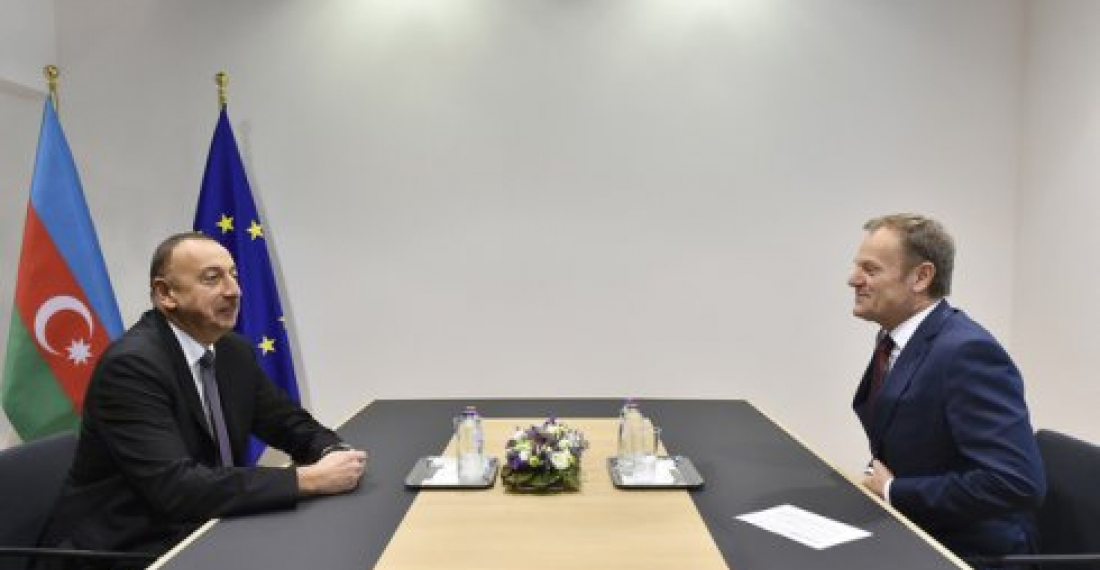This is a commentary prepared by the editorial team of Commonspace.eu
The European Union Commissioner for Neighbourhood policy and Enlargement negotiations, Johannes Hahn, will visit Azerbaijan next week. The visit has been described by the Head of the EU Delegation in Baku, Ambassador Melana Mard as "important". Mard told the Azerbaijani media that such visits to partner countries were normal, and that Hahn's visit will also be part of the preparations for the Summit between the EU and the Eastern Partnership countries scheduled for November.
The visit however also comes at a crucial moment in EU-Azerbaijan relations. The two sides in February launched negotiations on a new framework agreement that will define the relationship between them for the next decade. Discussion are ongoing, and a new round is expected to take place in Baku also next week, with "political security and trade", reportedly on the agenda.
Both Azerbaijan and the European Union see benefit in strong ties between them, are keen to push the negotiations forward and bring them to a quick and successful conclusion.
There are however outstanding issues in the bilateral agenda that provide both sides with challenges. Some are technical, and are related to the need for Azerbaijan to update a raft of laws, measures and practises in the business and economy sphere. Some are more problematic since they are in the political sphere. There are concerns in Brussels regarding a number of governance issues, and a desire to see the Azerbaijani government doing more to address these concerns. EU officials made it clear at the start of the negotiations that these issues cannot be excluded from the relationship. Recent reports about incidences of abuse in prisons, as well as the issue of Azerbaijanis living in Georgia, addressed in a statement issued by the European Union on 4 June (read it here), complicate the context of the ongoing discussions.
Commissioner Hahn will have to address these issues when discussing with the Azerbaijani leadership next week. There are however no quick fixes. The process of reform in Azerbaijan is ongoing, but moving at a slower pace than was expected when president Ilham Aliev came to power in 2003. The European Union can nudge the process forward, but cannot push it beyond where the Azerbaijani leadership want to go. Patience is going to be required all round. The European Union however needs also to develop lines of communication with different elements of Azerbaijani society, including the political opposition. This process should be transparent, and properly communicated to the Azerbaijani authorities to avoid misperception, but it cannot be avoided. It is in everyone's interest that if there is going to be a new EU-Azerbaijan agreement this should have the broadest support possible within Azerbaijani society.
Another issue that hovers in the background is Nagorno-Karabakh. The EU is committed to a peaceful solution of the Karabakh conflict, and to supporting the work of the Minsk Group in this direction. The EU recognises the territorial integrity of the three South Caucasus countries. That ticks one important box for the Azerbaijani side. On this basis the EU does not deal with the de facto authorities in Nagorno-Karabakh. Unlike in other scenarios, such as in Abkhazia and South Ossetia and in Transdniestr the EU does not have a role in the mediation process. This means it sees no justification for engagement with the de facto authorities beyond the barest minimum. Finding the right wording for dealing with this issue in the new agreement will be challenging, especially since this wording needs to be in harmony with the wording that will be used in the EU-Armenia agreement, which is currently under consideration and which Armenia hopes to sign by the end of the year. Flexibility will be required on all sides - something which is in very short supply.
The European Union needs to remain fully engaged with Azerbaijan, working closely in partnership with the government, but also ensuring that other parts of society feel ownership of the relationship. During his visit to Baku, Commissioner Hahn needs to be firm but fair, principled, but not inflexible. There may be those in the EU and in the region, who for narrow reasons may want the negotiations between Azerbaijan and the European Union to fail. That must not be allowed to happen. The European Union is engaged in a delicate balancing act in its relationship with Azerbaijan. It is a difficult task, but necessary.
This commentary was prepared by the editorial team of Commonspace.eu
Photo: President Aliyev of Azerbaijan meeting with the President of the European Council, Donald Tusk in Brussels in February 2017 (archive picture).






